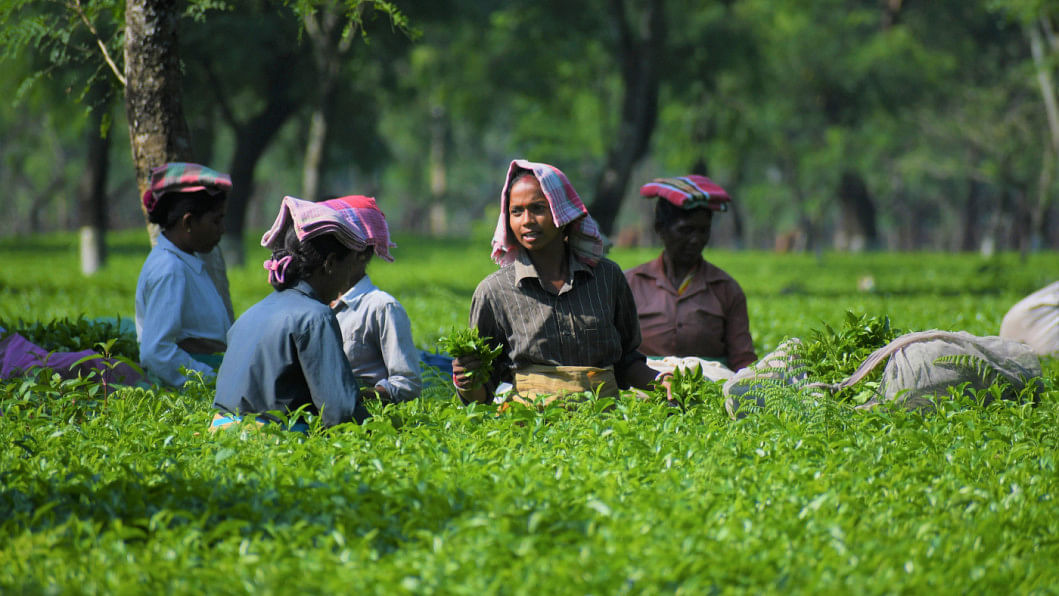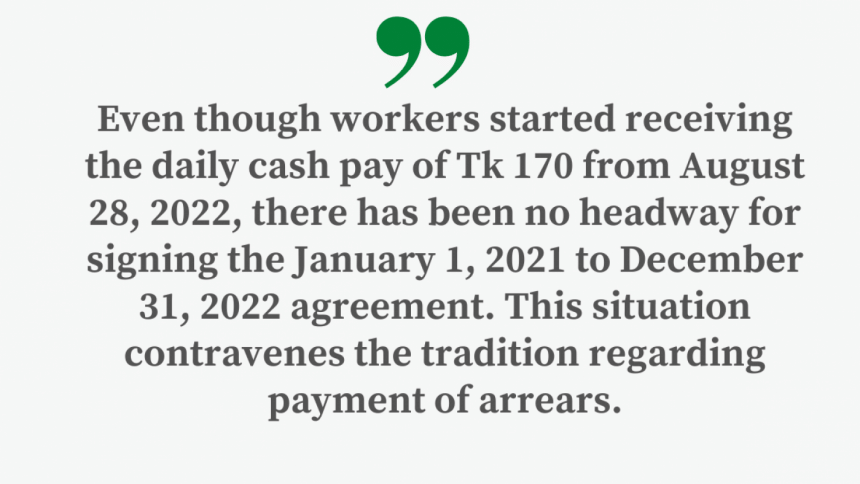No justice in paying tea workers’ arrears

Foremost of the factors that determine the economic fate of tea workers in Bangladesh is the agreement that the Bangladesh Tea Association (BTA) and Bangladesh Cha Sramik Union (BCSU) sign every two years. While BTA represents owners of the tea gardens, BCSU is the only trade union for around 1,38,000 tea workers and their combined bargaining agent (or CBA).
However, this bi-annual agreement is never signed on time. For instance, the agreement effective for January 1, 2019 to December 31, 2020 was signed on February 25, 2021. The tea workers got their additional pay for 26 months in arrears in four instalments. Additional cash pay for these 26 months was Tk 18 per day.
More baffling is the fact that no agreement has yet been signed for the period from January 1, 2021 to December 31, 2022. Such payment of arrears has become part of the culture in Bangladesh's tea gardens.
Extremely dissatisfied with this delay and the stubbornness of BTA in not increasing wages, the tea workers went on an unprecedented strike from August 9 to 27 in 2022. Finally, the prime minister stepped in and fixed the daily cash pay at Tk 170, which is an increase of Tk 50 and Tk 130 less than what workers had demanded.
Still, they went back to work from August 28 in hopes that they would get the increased wage from January 2023. A registered worker who had worked all days during the 20-month arrear period would get Tk 30,000, a good sum for the impoverished tea workers.

Dr Kazi Muzafar Ahmed, secretary of the BTA, said in an interview with The Business Post last August, "The permanent workers will get arrears, and we will set the number of instalments in a meeting with the BCSU. The association will not facilitate any arrears for casual workers, as they are out of our purview." Some gardens were preparing to roll such payment as well.
But the owners' fickleness about signing of the agreement has come as a big shock to tea garden workers.
The BTA and BCSU had already had 15 meetings before the August 2022 strike, to reach an agreement. After the strike ended, they held several meetings. The tea workers' representatives were shocked to find that owners were now reluctant to even pay part of the arrear, let alone the full. So, even though workers started receiving the daily cash pay of Tk 170 from August 28, 2022, there has been no headway for signing the January 1, 2021 to December 31, 2022 agreement. This situation contravenes the tradition regarding payment of arrears.
And common tea workers are reluctant to compromise: "The agreement between the owners and workers is signed late and we get the increased pay in arrears from the first day of the following agreement period," says Sreemati Bauri (40), a tea worker and vice president of BCSU's Juri Valley committee. "We want our full arrears at the rate of Tk 50 per day for the full agreement period."
"If the owners do not sign and execute the agreement starting from January 1, 2021 and do not pay our arrears in full, we will go on strike again," said tealeaf picker Bisakha (40) of Madhobpur Tea Estate in Kamalganj upazila.
The leaders of BCSU are having a hard time negotiating with the owners. Helpless, they have sent an appeal to the PM dated November 14, 2022 in which they pointed out that the owners are now reluctant to pay the increased daily wage starting after the expiration of the last agreement period. BCSU alleges that the arrogance of the owners is causing delay in the signing of the agreement even after the agreement period ended on December 31, 2022.
Three days before the end of the 2021-22 agreement period, a 10-member team of seven vice presidents of seven valleys and three central committee members of BCSU met the Director General of the Department of Labour (DL) in Dhaka. A number of the labour leaders have said that they have learned from an official of the Department of Labour that the owners were willing to pay the arrears at the rate of Tk 17 a day, not Tk 50. Some BCSU leaders were reportedly ready to compromise and accept arrears between Tk 25 and Tk 30. But the majority of leaders rejected this and the meeting ended with no positive outcome.
The three minimum wage boards set up so far for the tea industry have fixed much lower wages compared to other industries. First, the minimum wage board is irregular in the tea industry as it is not formed every five years. Second, the latest minimum wage board interfered in affairs beyond its jurisdiction and the outcome turned out to be unpredictably sad. The current wage board, set up in October 2019, has not even published the gazette finalising the wage structure.
In any industry, the responsibility of fixing wages is bestowed upon the minimum wage board. However, the tea industry is entirely exceptional. The workers in this industry live within the boundaries of the tea gardens. They do not have homesteads of their own. The state owns the land of the tea gardens, excluding those in north Bengal.
Therefore, the current proposal of the BTA to the government to "let the minimum wage board fix the wage" is not acceptable without elaborate discussion with workers.
According to Rambhajan Kairi, the workers' representative, another BTA proposal is that the agreement between the BTA and BCSU be signed every three years. BTA also suggests if the agreement is signed every two years following the long tradition, it should deal with all other issues except wages. But Kairi's reasonable argument is that the owners, tea workers, and the state must have open and elaborate discussions before bringing any change to the current tradition. And the workers' interest must get the right consideration in such discussions.
For an exit out of the current stalemate, the BTA should immediately accept the legitimate demand of tea garden workers and sign the agreement for the period from January 1, 2021 to December 31, 2022. Then, the negotiation would be due for the following agreement period starting on January 1, 2023. On another note, if the minimum wage board is regularised in the tea industry, it must grant pragmatic consideration to the living costs of tea workers and other factors that section 141 of the labour laws mentions.
Phillip Gain is researcher and director at the Society for Environment and Human Development (SEHD).

 For all latest news, follow The Daily Star's Google News channel.
For all latest news, follow The Daily Star's Google News channel. 









Comments